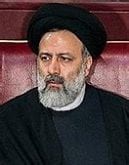Al-Monitor – “Regional presence grants us strategic influence and greater national power,” Iran’s Supreme Leader Ayatollah Ali Khamenei told members of the Assembly of Experts, a body of Iran’s most powerful clerics, constitutionally in charge of supervising his performance.
“Why do we have to give up on [such activities]?” Khamenei asked rhetorically. He was addressing criticism both at home and abroad on the Islamic Republic’s overseas activities, mainly in Iraq, Syria, Yemen and the wider Middle East.
Western states see Iran’s direct military presence or support for a vast network of armed proxies as destabilizing. At home also, opponents have questioned the costly missions while ordinary Iranians are struggling under economic strains stemming from domestic corruption and international sanctions.
“Backing off in the face of America or any other power to avoid sanctions is a serious mistake that deals a blow to political power,” Khamenei declared. The 82-year-old cleric dismissed as “simple-minded naivete” arguments that Iran should try to avoid providing adversaries with a pretext for pressure.
Iran’s moderate factions have over years demanded that the Islamic Republic compromise with the Western world. Most notably in 2016, the late Akbar Hashemi Rafsanjani, one of the most powerful figures in the history of the Islamic republic, had to face Khamenei’s public rebuke after famously saying that “the world of tomorrow is a world of discourse, not missiles.”
In his speech, Khamenei suggested that Iran is in a better position now, “facing no threats,” thanks to his refusal of “suggestions to reduce our defense capabilities to avoid tampering with the sensitivities of the enemy.”
For over two decades, the Quds Force, the overseas branch of the Islamic Revolutionary Guard Corps (IRGC), has led in implementing the Islamic Republic’s regional influence doctrine. In Syria, particularly, the elite force has been actively engaged, a presence Tehran says was warranted by the government of its ally, President Bashar al-Assad.
Iran’s number one enemy, Israel, frequently bombs IRGC-run facilities near its doorsteps. Only on Tuesday, Iran confirmed that two IRGC high-ranking officers were killed in an Israeli strike outside the Syrian capital.
“Israel pounded the Iranian base on the outskirts of Damascus even as Bennett’s plane had not yet taken off from Moscow,” tweeted Ehsan Soltani, an Italy-based Middle East analyst, in reference to a meeting between Israeli Premier Naftali Bennett and Russian President Vladimir Putin.
The comment also echoed assertions that for all the military spending and boots on the ground, Iran has been effectively side-lined from the Syria scene by Russia, which tends to put Israel before the Islamic Republic in its overall Middle East strategy.
 Shabtabnews In this dark night, I have lost my way – Arise from a corner, oh you the star of guidance.
Shabtabnews In this dark night, I have lost my way – Arise from a corner, oh you the star of guidance.



